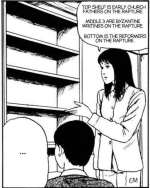Matt 24:40 Then shall two be in the field; the one shall be taken, and the other left. 41 Two women shall be grinding at the mill; the one shall be taken, and the other left. 42 Watch therefore: for ye know not what hour your Lord doth come.
Does this passage describe "the rapture", the Second Coming (or other)?
The coming of Christ for his saints is a
joyous occasion and is meant to be a
comfort to believers (1 Thess 4:13-18).
Context is always keen when interpreting scripture. As most have pointed out the text is very plain that those left behind are similar to those who were taken away in Noah’s flood in
judgment. I have personally gone through every passage where
“The Day of the Lord” is mentioned (I counted 29 times) and it
always refers to a time of
judgment. It is in contrast to Christ coming for his saints.
“
A thief in the night” is never used to refer to the
rapture or the gathering together of His saints. In
2 Peter 3:10 the term is a reference to to the judgment that concludes the Millennium when the earth is destroyed. The context of Matthew 24 where Jesus talks about those “taken away” is he immediately talks about making those left on earth (the faithful servants) rulers over his household. Then Matthew 25 starts with the foolish and wise virgins and the five talents where the Lord will make those who were faithful “ruler over many things” (Matt 25:21) and the unprofitable servants (the ones taken in judgment) are thrown into outer darkness (Matthew 25:30). And then immediately after that we have the
judgment of the nations when the Son of man shall come in his glory and sit upon the throne of glory to begin His Millennial reign upon the earth.
Symbolism. In the Book of Revelation
like and
as are used throughout the book which shows us where passages should be taken
literally. This is in contrast to the first few chapters of the Book of Genesis. I read this simple rule somewhere but don’t remember where.
“If the
literal meaning of a passage leads to
obvious absurdity, but a
figurative meaning yields
clarity, then the passage is probably using symbols. For example, in
Exodus 19:4, God tells Israel,
“I carried you on eagles’ wings.” A literal reading of this statement would lead to absurdity – God did not use real eagles to airlift His people out of Egypt. The statement is obviously symbolic; God is emphasizing the speed and strength with which He delivered Israel.”
In
Revelation 20 You don’t find anywhere the expression “like” or “as” a thousand years. Just like in the Book of Genesis you don’t find “like” and “as” in reference to Adam and Eve or the seven days of creation. The main reason I hold to dispensationalism (the progressive dispensing of revelation) is it is the only method of interpretation that fits in with the literal fulfillment of the prophecies in the Old Testament. Christians can disagree on many of the details of the Second Coming of Christ but we should show enough grace to disagree respectfully realizing none of us are infallible in understanding all the details.


